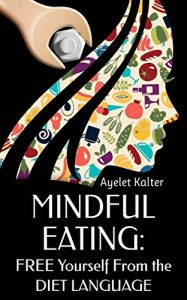Is obesity a disease, and weight loss is the solution?
That is the common belief. Yet, studies have since refuted this assumption, and from my experience I have learned that it is far from reality, but even so, this is still the given opinion among the masses. The pursuit of thinness, the diet that accompanies it, and the failure therein has created a language (for lack of a better term). A language of eating - the Diet Language. This is a language administrated by control, intimidation, abstention and threat and by an external imposition dictating what to eat, when, how much, how to feel and what to think before, during and after eating. Many are convinced that food must be feared, that you have to exercise a lot to lose weight, that you have to count calories, and routinely weigh yourself. Many people are mistaken, confusing how they think about reality and its true nature. This confusion creates suffering.
We should take another moment to consider a fundamental question: what is obesity?
The traditional definition of obesity fits in with the mechanistic philosophy, which regards good health as the absence of risk factors. According to this outlook, obesity is a disease and health is the lack of disease. The weight centered approach assumes that losing weight is essential to improving health.This book presents a different eating language, "Mindful Eating".
This approach will snap the chains of the old diet culture which bind you to its rules and language. My call to you is not “Let us be fat,” however, but “Let's accept what we cannot change about our bodies in order to change what we can.”What Mindful Eating offers us is simply a return to sane eating which normalizes the way we eat and how we feel about our bodies regardless of our body weight. Within the human race, there exists a natural and legitimate diversity in body shape and weight. Recognizing this diversity and acknowledging the eating patterns specific to each one of us could help make our lives freer, and surprisingly more healthy and valuable too.












